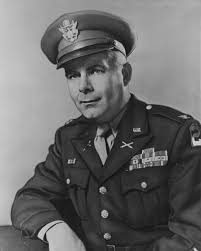The detail of 1619 officers, men and civilians were assembled early this morning with their equipment. Our destination was plainly Japan. Each officer had been issued the Japanese soldiers secondhand woolen uniform and no provisions had been made for head covering, socks, or footwear. All members of the detail had been issued soap and two packages of Japanese cigarettes. The detail fell in at about 8:30 AM. After being checked, was told to fall out and await further orders. About 11:30 the word was passed around to reform the detail. We were marched out of Bilibid Prison, through downtown Manila towards the port area.
Colonel Warner, from Baltimore, who had not been well, suffered severely from a combination of the heat and physical fatigue and finally stumbled and fell. An effort was made to place him on a truck driven by a Japanese soldier, but the officer in charge did not allow it. Some of his fellow officers finally assisted him and he made the march successfully to Pier 10. Lying beside was a very nice looking modern vessel of about 10,000 tons displacement, called the Oryoku Maru. At about 2:00 PM we were loaded into the vessel which turned out to be one of the so-called Japanese luxury liners, which had made the Manila run before the war. The holds in which we were placed were really trunk compartments and no means of ventilation or lighting was provided. The forward hold into which Colonel Warner and myself and many other officers were placed had been loaded with hay and there were some remnants of it still in the hold. I imagine that over 500 men were packed in and with us it made it so crowded that no one had sufficient room to lie down. There was only the barest space to sit with your knees drawn up under your own. Protestations were made to the Japanese about the overcrowding and we were told that readjustment would be made at some later time.
An evening meal of rice and fish with a small amount of water was served. Very shortly after dark the vessel got under way. Absolutely no ventilation was provided. The air became very foul. Colonel Brettell and Colonel Conety who both suffered from asthma, were soon in a critical condition. After long protestations to the Japanese we were finally allowed to send them up one ladder to the deck, but for some reason which I will never know, we were soon made to bring them back again. Both died that night; in addition, I estimate about 25 men died in the forward hold that night from suffocation.
